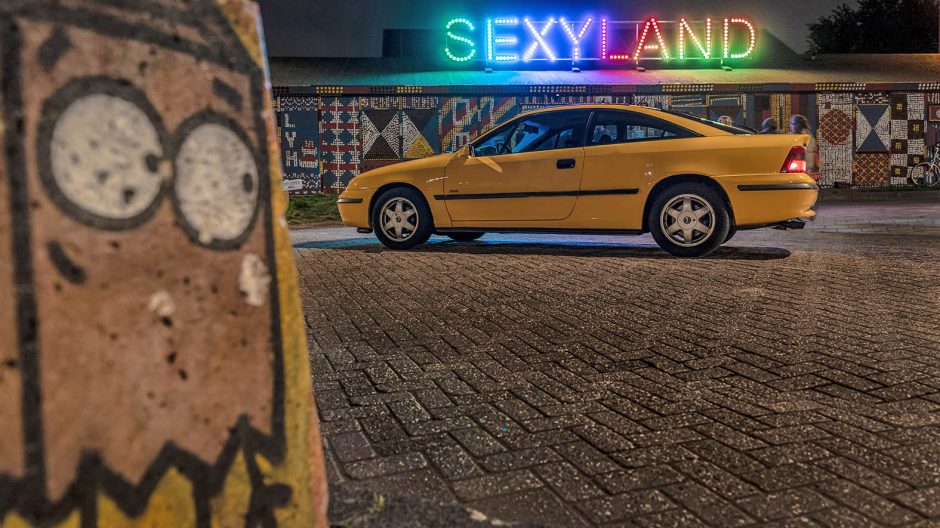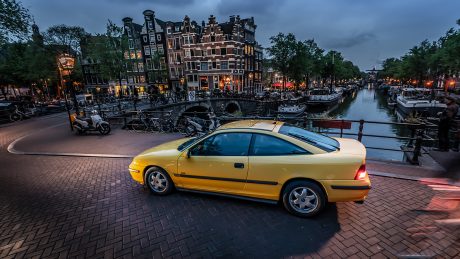- Welkom in Amsterdam: Zu seinem 30. Geburtstag stattet der Opel Calibra der niederländischen Hauptstadt einen Besuch ab.
–––––
Rüsselsheim, Amsterdam, Zandvoort:
a roadtrip serves as birthday gift
–––––
When the borderless side windows hit the thick rubber seal strip of the roof edge, the 1990s are suddenly back within reach. Your eyes roam over a clear, angular cockpit with plenty of matching decoration, your hands clasp on a four-spoke steering wheel, and your heart skips a beat when you cast your gaze upon the delicate central console. If this were a movie, there would be nothing to stop a parting kiss. But we’re still an entire road trip away from that. First, we sink into the comfortable sporty seats and ask ourselves: has it really been 30 years already?
THE MANTA SUCCESSOR TURNS 30
For all those who also can’t believe it: It’s true, the Calibra is celebrating its 30th birthday this year. Opel started sending the wonderful, affordable coupé for the masses to the races in 1989 as a successor to the Manta. We’re taking a yellow Calibra 4×4 out for this milestone birthday, which loyally and dutifully enriched the Opel Classic up until a few weeks ago. It has now been given its first actual license plate, been registered for the road, and is ready to go. We head off together on our trip from Rüsselsheim to the coast, with a pit stop in Amsterdam.
![]()
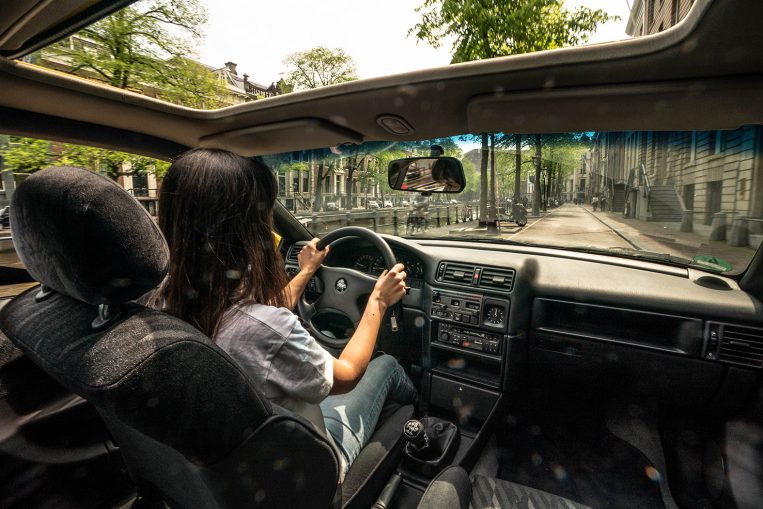
Sunroof, comfortable seats, four-spoke steering wheel: The cockpit of the Calibra still always impresses with its understated elegance.
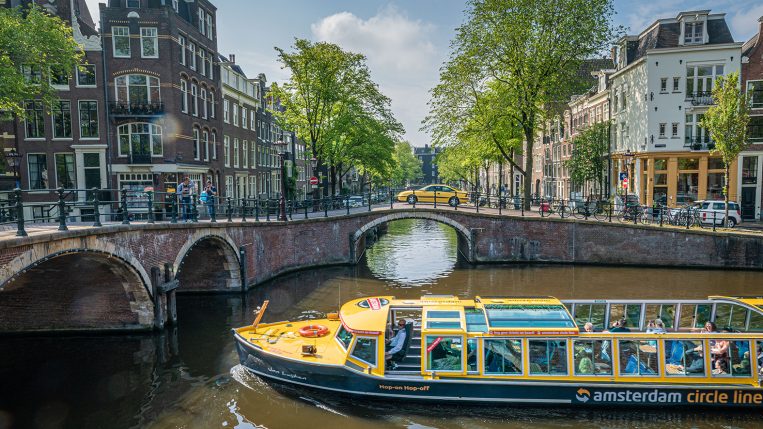
Time for a history lesson: In the 13th century, Amsterdam was a fishing village located behind a dike that protected it from the water coming from the Amstel. It was initially known as the Amstelredam, which refers to the dam and the Amstel.
![]()
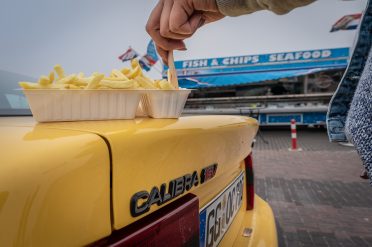
A helping of fries with mayonnaise, please: While the potato sticks often play second fiddle as a side order in Germany, they are much preferred as the main event of a meal in the Netherlands.
![]()
–––––
Fried foods, canals
and loads of tulips
–––––
It’s no secret that Amsterdam has been one of Europe’s most popular cities for decades. For drivers on the other hand, the city is double-edged sword. That’s because the dreamy little streets flanking Amsterdam’s approximately 200 canals are jam packed more often than not – except if you drive on them just after sunset, or shortly before the night takes over.
BOOMING BUSINESS
The Calibra opts for the blue hour and circles the city center following the oldest of the canals. Once upon a time, they served as transport routes for boats and as sewers for the residents. These days, they mainly make tourists who explore them on small floating barges happy. Sightseeing cruises love to stop in front particularly narrow houses and tell tales of a time in which the width of the buildings determined how much duty had to be paid. As a result, particularly slender houses were built during nautical era – the thinnest measures just 1.5 meters.
Along with their idiosyncratic culinary approach of deep-frying something to eat come hell or high water, the Dutch also love flowers. Every resident spends about €80 each year on tulips and other flowers. They are also a leading export, with around €8 billion being spent globally on flowers from the Netherlands every year.
![]()
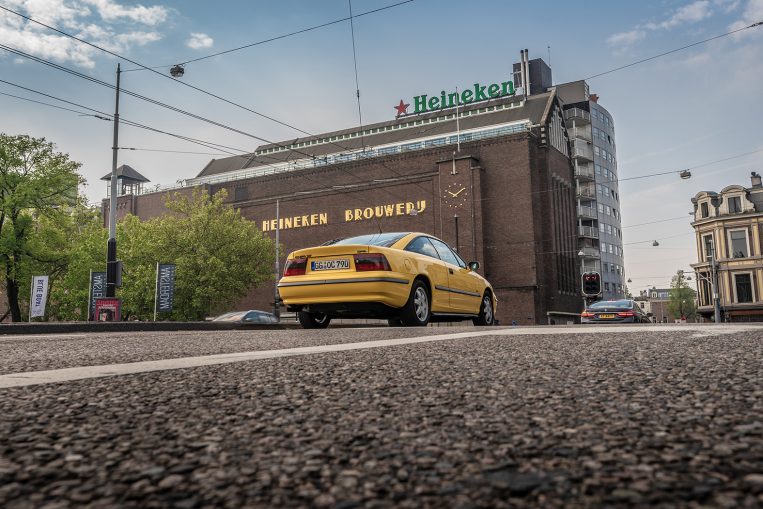
Time for a drink: Founded in 1864, the Heineken brewery also calls Amsterdam home.
![]()
![]()
–––––
Bicycle cult, coffee shops
and red lights
–––––
The humble bicycle is equally popular in the Netherlands. There are now supposedly more bikes than residents in Amsterdam, with the city being home 865,000 of them. The fact that the “fiets” (as the Dutch call it) is one of the most popular forms of transport also doesn’t go unnoticed behind the wheel of our Calibra: no matter around which corner we want to turn, the procession of cyclists feels never ending.
AMSTERDAM’s Triptych
Three other distinctive features about the city are worth mentioning: Amsterdam is home to coffee shops that rarely serve a good cup of coffee, but instead sell legal cannabis to give locals a pleasurable pit stop. A completely different sort of pleasure can be found around the Oude Kerk (old church) – the oldest church in the city – since it stands in De Wallen, the city’s main red-light district. Here, scantily clad women of all shapes, sizes, and ages writhe around in colorfully lit windows. When a client enters, the curtains are drawn and the rest needs no explanation. Prinsengracht 296K has something more informative to offer – here you can discover the story of the water loft in the unique houseboat museum.
![]()
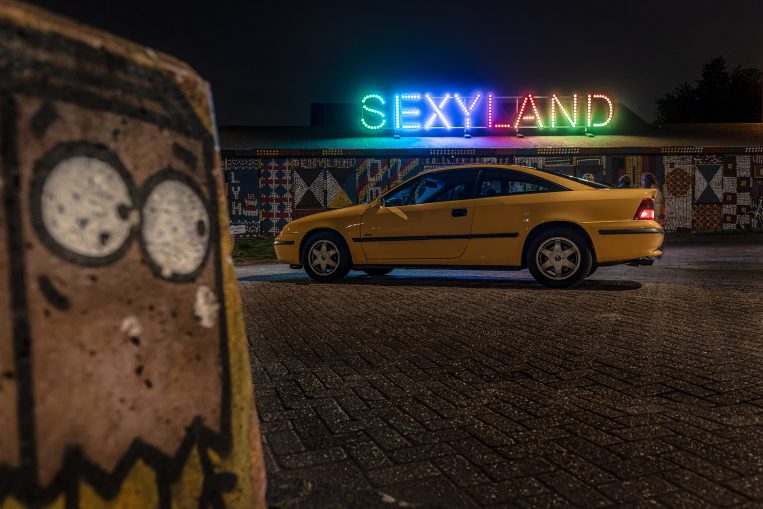
Head turner: The yellow birthday car gets everyone on the post-industrial NDSM site’s attention at night as well.
![]()
–––––
Facts and Figures
The Calibra succeeded the popular Manta in 1989 and embodied a classic four-seater coupé that Opel molded into a timeless design. Anyone who wasn’t satisfied with the standard 115-HP, 2.0-liter engine chose the 2.0 16 V turbo with 240 HP and reached speeds of up to 245 km/h.
The Calibra competed in the German Touring Car Championship with a 450-HP V6 engine with which Manuel Reuter won the title in 1996. But the two-door model never took off: it cost 36,900 marks at launch, while you would have expected to shell out almost 55,000 marks for the V6 in the mid-90s.
Almost 240,000 Calibras were produced until 1997 – and its successor had actually already been decided. There was even a tasty prototype – but then GM hit the emergency brake.
–––––
Had enough of the city? The Calibra thinks so too and whisks us off to the countryside – and towards the coast. Its aerodynamic shape means it has never needed a lot of horsepower to serve up a slice of driving pleasure. And it has enough space for its passengers without compromising on comfort since it’s designed to be a sports car for the masses. It’s incredible how highly regarded a sporty coupé’s suspension was 30 years ago – these days every other mid-range sedan jolts around more.
ON A WAVE OF SYMPATHY
We comfortably whiz along to the ocean without a care in the world, accompanied by the rare feeling of sitting in a vintage car that doesn’t feel like one at all. By that we mean all the worries that usually come along for the ride in a vintage car. Nobody asks if the Calibra will arrive at its destination. It makes people happy – and amazes them with how vivaciously its two-liter engine roars into life. How full it sounds when 6,000 revolutions and 150 HP set the tone.
The waves clap enthusiastically on the sandy beach as we arrive in Zandvoort. We park our yellow Calibra right on the coast and let it catch its breath. How timeless it looks sitting there – the beautiful, now 30-year-old lightning bolt.
![]()
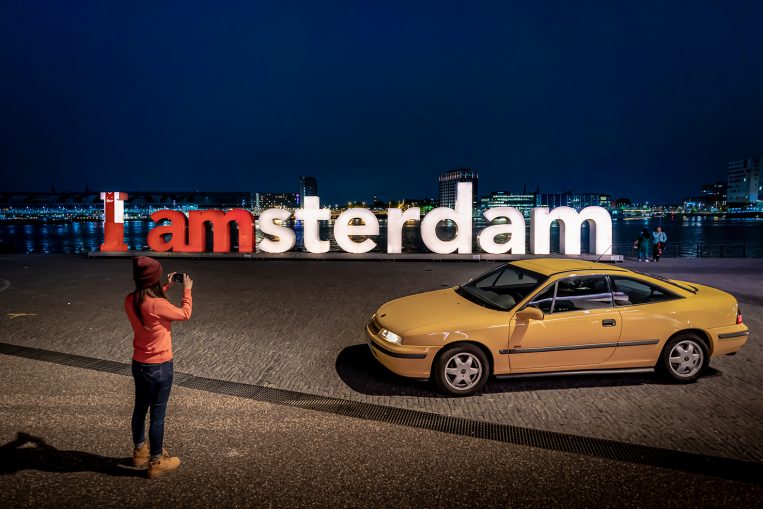
Say cheese: The Calibra poses in front of an illuminated backdrop that is actually only meant for pedestrians.
August 2019
